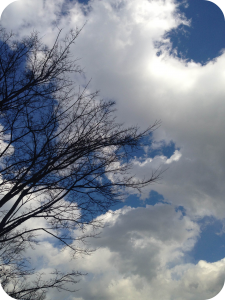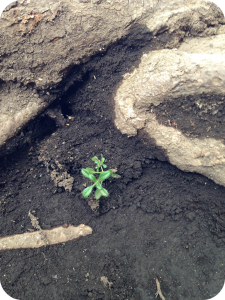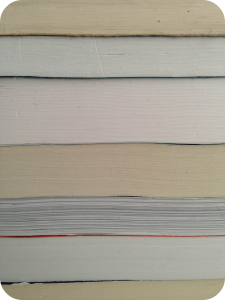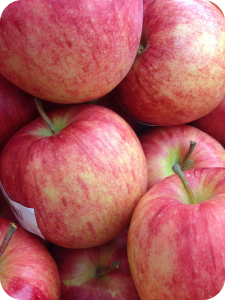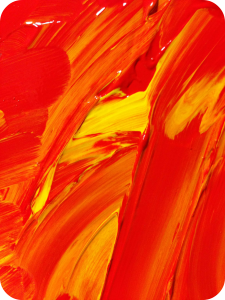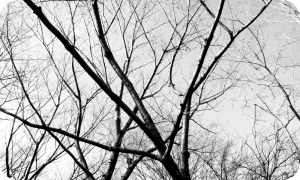Posts Tagged ‘the 500-word project’
Portland, Oregon / Spring, 2002
“How’s this pressure?” I asked, pushing my forearm into the long muscles of Linda’s upper thigh.
“Perfect,” she said, turning her head to the side in the face cradle. “You can continue that way up into my hips.”
Linda was a favorite of mine, as far as regular clients went. She came to me for bodywork about once a week, and we generally chatted amiably throughout our sessions.
After working the tissues in her hips and feeling some release, I began to rock Linda’s pelvis back and forth, letting her body move side to side with its own momentum, waiting for it to come back and meet me before gently pushing again.
This was a move Linda generally enjoyed quite a lot, and I watched her body sway with it, allowing the vibrations running through her to have their effect.
But after a moment her breathing started to catch, quickening and becoming shallow. I heard a sniffle and moved my hand gently to her lower back, letting her body come completely to rest.
“Are you OK?” I asked, moving closer to her head, my hand still on her back.
She turned her face to the side, tears streaming from her eyes. “I don’t know why I’m crying,” she said apologetically.
“It’s OK. Let’s just let it be how it has to be,” I answered. “What can I do for you?”
“A tissue?” she asked, sitting up and gathering the sheet against her as I handed her the box.
Her face was crumpled in a pain that I intuitively knew wasn’t physical. She let her head hang, sobbing, and her body shook in waves.
Sensing that she didn’t need to be touched, I stood back, waiting. At last her body came to rest and a peace fell over the room.
She looked up at me and said, “Do you ever feel …? It’s just that sometimes I get the feeling that nothing is ever enough. That no matter what I do it’s not enough. I just keep going, keep running, keep working, but it’s not enough. Is that crazy?”
“I think that’s a fairly common feeling, actually. Not crazy at all.”
“Is it?” she asked, her face lifting hopefully. “You think lots of people feel that way?”
“Absolutely,” I said. “I do.”
“Well, that’s a relief,” she said, sighing and turning again to rest face-down on the table. “Will you work on my hips again? Just a bit more?”
I continued with the rest of the massage, finishing with my hands gently cradling her head as she lay supine on the table. Her face was smooth and open, her lips curved softly upward.
As she walked out to the front desk, Linda’s gait looked looser, freer. Handing me her check, she grasped my hand and held it for a long moment, looking directly in my eyes. “I just want to thank you,” she said. “That was exactly what I needed.”
“My pleasure,” I smiled.
And it was.
Sunlight streams through the open window next to me, and the early spring breeze carries a fresh, inviting brightness with it. Reluctantly I turn my body back in toward the classroom, where in contrast the light feels paltry, dim, inadequate.
I focus my attention on my notebook, endeavoring to catch up. The professor speaks in his usual engaging way, and the other students are present and alert.
We’re talking about Wittgenstein, and it’s unbearable. I’m not entirely sure why, but my mind feels pressed down upon by the weight of other people’s thoughts. It’s as if I’ve been trying to carry all of them stacked upon one another like thousands of aging, translucent pages–feeble, fragile, no longer alive with relevance.
My gaze drags back to the day outside, to the bright reflectiveness of the soft blades of grass, the buds on each tree branch urging themselves outward. I ache to join it all. My body is nearly in revolt, refusing the reality of the room I’m in, longing to get out.
I notice how the roots of the trees clench the earth, like fingers digging into it, and have to fight the nearly irresistible urge to leave my chair and go kneel out there. Kneel on the slightly damp dirt and dig my hands into it, the way the roots of the trees cling to the earth but are also just part of it, extensions of it. As am I. Just an extension of all that dirt, that grass, those roots, the buds, the branches, the sunshine.
I want to put my hands in it, to feel the texture of the soil, to smell it, to know what it’s like to get my own roots in there. To dirty myself, to be part of it. Part of the day, part of my own life.
It’s almost erotic, this yearning, and I find myself fidgeting in my chair. I want to engage, and not with thoughts or ideas. I want to engage with the dirt of the place where I live. I want to mix with the life that’s in evidence right out there, just feet away from where I sit.
My mind controls me, keeps me in my seat, but I can’t concentrate. My only thoughts are of what my body wants and needs–to get out as soon as possible.
After class, I go lie in the grass, resting my head on the stack of books inside my bag. As overwhelming as the urge had been to be out here, I can’t just kneel and dig my hands in the dirt. What would the people passing by think?
So I lie still, looking up at the sky between the branches of the trees, imagining what I’ll do with my life once I’ve got the degree and am free of the confines and the ideas and the rules and the way things always have to be just so. Free to dig my hands into whatever I want.
I cross the street from Nørreport Station and step into Fiolstræde, enjoying the light of the early spring morning on my well-worn path to school. A man stands eating a sausage in front of the hot dog wagon. Cyclists roll over still-wet flagstones, and pigeons loiter hopefully in front of the vegetable stand. What was once foreign is familiar now, and dear to me.
Normally I pass the bookstore on the corner with some curiosity, but I almost never go in. There’s a book I’ve had in mind, though; a particular passage in a book, actually. I’ve been fruitlessly searching Copenhagen’s bookstores for it since shortly after I arrived nine months ago, and suddenly feel the urge to try again.
The clerk looks dubious when I tell her the title of the book, but asks for a few minutes to research whether or not they carry it.
I make my way through the Danish titles and settle in the children’s section, where a beautifully illustrated copy of H.C Andersen’s stories lays waiting to be read. Much to my delight, words that would’ve made no sense just months ago unfold into meaning. I’m still engrossed when the clerk approaches, looking apologetic. The book could be imported for me, it seems, but at a steep price. I thank her and step back into the street.
At idle moments throughout the day I try to excavate parts of the passage from my mind, but I know it’s still not right. Frustrated, I go to the school’s library and run an internet search, but turn up nothing.
Late that afternoon on the train home, I try to focus on my reading but end up staring out the window instead. It’s gently raining again, and the clouds hang low in the sky. Drops of water slip down the window, only slightly obscuring the passing scenery. I watch the red-tiled houses, the streets, the cars, the shops. A pair of teenage girls walk arm-in-arm. A mother pushes a large black pram across an intersection. All the while my brain works, trying to tease out a clearer memory of the passage I’ve become stuck on.
Descending the stairs in the station, I pause before turning toward home and instead go in the other direction. I’m not entirely sure why, but I head past the grocery store and the entrance to the shopping center.
My eyes sweep across the square and my attention catches on the glass enclosure of the library’s entryway. I’ve only been in once or twice, but I’m unquestionably drawn to it now. There’s no chance of my book being there, I know, but it’ll be fun to look.
The English section is small, tidy, spare. I peruse the shelves, curious. There’s nothing to surprise me there: Austen, Dickens, Hemingway.
But, suddenly, there–on the second lowest shelf, in a small library in a suburb of Copenhagen–stands the very familiar spine of my much longed-for book.
Right where I’d never hoped to look.
This shouldn’t be such a big deal. Why does it feel like a big deal?
You fish in your bag, checking for your keys. Still there. Wallet too. It’s okay. Everything’s okay.
It’s mid-morning in grimy, glittering, early-summer Chicago, and you’re alone in the world. Or, at least, alone on your way to the grocery store.
There’ve been so many firsts these last few weeks. First time moving to a city, first time living away from home or the insulated world of your small college, first time looking for a job with no connections whatsoever. And now this: your first time going to a grocery store by yourself. Somehow this is the most intimidating task yet. In some deep and undeniable way, it signifies an ability to take care of yourself. It means you’re one step closer to full adulthood and its attendant weights and responsibilities.
As ridiculous as it seems to you, you’re awash in anxiety, unsure you can do this. And yet you push onward, your stride purposeful, careful to arrange a look of assurance about you.
As you step through the automatic doors of the grocery store, your mood lifts somewhat at the sight of the vivid colors spilling out from the florist’s corner. The frigid air of the produce section is startling and you pull your hands to your upper arms, rubbing your skin to bring yourself some warmth, indulging in a secret half-hug.
Then, approaching a stack of apples, you suddenly realize that you’re not choosing for anyone but yourself. You can have exactly the apples you like. As you walk around collecting items in your basket, the fear that’s been squeezing your stomach begins to relax its grasp.
It’s just a grocery store, after all. In fact, browsing around, choosing carefully, thinking about the meals you might eat–it’s all kind of fun. Exhilarating, even. There’s a power in it, an enjoyment. This is your morning, your day, and you’re making decisions with it. Decisions that will affect your future, if only the future of your meals. Is this what it feels like to be an actual grown-up, driving your own life?
Walking home, you find that your step has a natural power to it; you’re not putting it on. Something has shifted back there amid those stacks of cans and boxes, between the pyramids of produce. You carry the grocery bags with a sense of assurance, one on each arm. This is a thing you can do.
After dark you visit the outdoor pool of the building where you’re staying. Completely alone, you slip into the water, savoring the freedom your body finds there, relishing the sensation of warm air on wet skin. Finally you let yourself come to rest on your back, floating weightlessly and studying all the lights surrounding you: those of the city, those of the sky. The moon’s lifted up high tonight, partial but luminous, far above any of the skyscrapers and incomparably beautiful.
It’s okay. Everything really is okay.
September, 2012
Tokyo, Japan
Kneeling on the floor blindfolded, I reach out with my right hand, searching. I have a sense of the general area of what I’m looking for, but can’t quite locate it. My hands grope in the air, sightlessly seeking.
And then a finger touches the smooth wetness of paint glopped onto my palette. Ah!
I smile, dipping the fingertips of both hands into the unseen colors, savoring their coolness. I lift my fingers, the paint clinging to them, and reach each hand out to either side of me, putting them down onto the rough white canvases waiting there.
I can picture the blank surfaces in my mind’s eye, imagine them being smeared with the reds, yellows and oranges coming off my fingertips, but not knowing for sure what they look like is exhilarating.
The beat of the music picks up and with it I dip my hands to the palette again, this time mixing the colors by gently rubbing my fingertips together. I put my hands to the canvases, moving with the beat, letting the music inform my every gesture, letting it become part of the painting.
Leaning again to the palette, I pull up more paint, scooping with my fingers and delighting in the sensation. Again I reach down to the canvases, body rocking, hands echoing the movement of the rest of my body, my fingers the very focus of the dance.
What’s happening underneath them? My only perception of the paint is through the touch of my skin, and in the unfamiliarity of this way of knowing I’m swept into a joyous reverie. I don’t know exactly what’s happening and I love it; I can’t see what kind of marks I’m making and I don’t care. I only want it to keep going, only want to keep living this feeling, keep experiencing this interlocked dance of body, paint and music.
The sensitive tips of my fingers are starting to become slightly bothered by the uniform bumps of the canvas, their subtle roughness more and more apparent as I continue to touch them.
Undeterred, I move my hands to the paint again, this time meeting my palms in front of my chest, feeling the paint warm with my touch. I wonder what color they are now, my hands. The urge to peek at what’s happening suddenly becomes nearly too much to resist, and yet I know that looking would somehow break the spell of this moment, and so hold back.
When a break comes in the music I find a natural pause too and lift my forearm to my face, pushing the blindfold from my eyes. To my right and to my left lie two paint be-smudged canvases, lively and glowing. Their frenetic energy pops out at me, a visual representation of the joyous wave I just rode.
They’re just finger paintings, yet caught in them is something else too. Dynamism, motion, energy. The pure bodily enjoyment of movement and touch.
May, 2003
Mount Koya, Japan
I hate this. I fucking hate this.
The thought curled up into my consciousness like a coil of smoke from the incense burning on the dais. The monks leading our meditation practice sat silent, as did everyone else. My thoughts were the loudest things in all existence.
Sitting back on my heels, a position called seiza in Japanese, my legs had already lost all sensation. As unobtrusively as possible, I wiggled myself back and forth. It helped momentarily, but then the tingling deepened, expanded, painfully filling my experience so no other thought could enter.
Opening one eye, I snuck a look at the friend I’d come with. She was sitting in seiza with seemingly effortless ease, breathing deeply, her stomach expanding and contracting with a naturalness I envied.
I’m not supposed to be here. I’m not cut out for this.
It’s not that I’d planned to be there. Having arrived in Japan less than a month earlier, I hadn’t made any plans for the holiday week that straddles the end of April and beginning of May. When my coworker mentioned the trip she was taking to Mount Koya, I’d asked if she minded me tagging along. She’d seemed happy to have a companion, and I’d been thrilled with the trip up to that point.
But somehow, sitting there trying to keep completely still, I felt that everything about the situation was wrong. I wanted to get up and run, twirl, kick, move. Feel my body. Shout. Scream, even, just to feel anything at all.
How much longer?
We’d trundled up there in a very old train, only a few cars long. It’d been charming and beautiful, climbing the mountain that way, watching the towns and villages pass by with their tiled roofs and hilly streets. As we’d climbed it’d gotten colder and colder until, at the very top, the weather was almost winter-like even as spring had fully descended at the mountain’s base.
Upon our arrival, a kindly monk had led us to our small tatami room with a sliding door, two futons stacked on the floor, and a kotatsu, the room’s only heating source. Before dawn the next morning, the same monk had come to get us for meditation practice. Following him along the path tracing the rock garden, I’d been excited to experience sitting in meditation. But the sitting itself felt interminable, unbearable, physically impossible.
What’s wrong with me? I can’t even meditate for half an hour. I suck in every way.
The taunting of my mind was far more painful than the experience in my body. Comparing, complaining, worrying, wondering, my mind mocked me ceaselessly, telling me how bad I was, how stupid. How I’d never be right. How everything I was doing was wrong.
I cracked open my eyes again to surreptitiously study the faces of the monks sitting in front of us, peace saturating their features. What was it they were experiencing? And could I ever find it too?
Winter, 1986
Seven years old
Boots crunching through the fresh snow covering the backyard, I headed toward the woods, sunlight filtering down through the interlaced branches of the tall trees all around and up the hill. In the summer it would be shady here, only dappled light touching the ground through a roof of tremulous green. But now all was bare, and the sun reached down to touch most of the snow that had fallen the night before.
My brother and I had been out to play just that morning, but after lunch he’d stayed in the warmth of the house to watch TV while I’d felt the pull back outdoors.
My eye caught the plastic playhouse that had been there for several years and that we rarely used anymore. Its colors were faded by sun exposure, the decals puckered and starting to pull away. As I opened the small half-door I saw that only a bit of snow had drifted in, not enough to cover much.
The winter sunlight slanted in the window, reflecting brightly off the snow on the bank that sloped up just outside. I sat in the small plastic chair and looked out, gathering my arms to my body to keep warm. My breath puffed out in clouds and I played with them, making them bigger, smaller, bigger again, watching the clouds appear and disperse in the space of one exhalation.
My attention caught on the bare tree branches, the sun skimming off them in a way that made them shiny and reflective. The branches themselves were beautiful, naked as they were, locked together and coming apart with the breeze, a tangled web of dormant life. The way the sun fell on the perfectly fresh snow made it glitter, and there were colors in it dancing, almost twinkling, that I’d never before appreciated in snow. Flashes of green, pink, orange, blue, tiny crystals of color bounced their light over the early afternoon.
Stillness wrapped all around. I stopped to listen, trying to find anything familiar–a car, a TV, a human voice, the skittering of a squirrel. There was only the very slight rustle of the wind in the branches high above me.
And in that near-silence, a sense of deep and boundless peace overcame me. Everything–everything–shimmered and quivered with life. Everything had a current running through it, and it ran through me too. My body shivered, but not with cold–with recognition. With acknowledgement. With a feeling of seeing, of having been seen. With a feeling of knowing that I was part of all that was, that all that was was part of me. There were no words to it, no thoughts. Just feeling, just beauty.
I thought, I want to keep this, and that very second it began to fade, dissolving like a cloud of breath. Completely gone, as quickly as it had come, leaving a little girl sitting on a plastic chair in a plastic house, overcome with wonder and awe.
